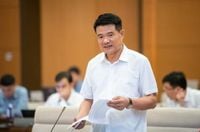On April 25, 2025, the National Assembly Standing Committee convened to discuss the draft Law amending and supplementing several articles of the Law on Organization of the People's Procuracy. This important legislative move aims to streamline the organizational structure of the People's Procuracy in Vietnam, ensuring it aligns with the government's objectives of efficiency and effectiveness.
Nguyen Huy Tien, the Head of the Supreme People's Procuracy (VKSNDTC), presented the draft law, emphasizing that its primary goal is to enhance the legal framework governing the People's Procuracy's structure. This overhaul is designed to meet the demands of a three-tiered system, consisting of the Supreme People's Procuracy, provincial People's Procuracies, and regional People's Procuracies. This change reflects the Party's directive to simplify and strengthen the organizational apparatus while improving operational efficacy.
The proposed amendments focus on modifying key regulations associated with the new organizational framework. Specifically, the draft includes changes to Clause 2 of Article 7, Points a and c of Clause 2 of Article 22, Clause 3 of Article 23, Clause 1 of Article 24, and several other articles, while repealing Articles 44, 45, and 65 from the draft law.
One significant aspect of the reform is the transition from a four-tiered model, which included the Supreme level, High level, provincial level, and district level, to a three-tiered model. This shift is in line with the Resolutions and Conclusions issued by the Central Executive Committee, the Politburo, and the Secretariat, aiming to enhance the operational effectiveness of the People's Procuracy at all levels.
Additionally, the draft law proposes to increase the maximum number of inspectors at the Supreme People's Procuracy from 19 to 27. This adjustment is intended to ensure that there are sufficient human resources available for prosecutorial duties and the oversight of trials conducted by the Council of Judges of the Supreme People's Court.
The law is set to take effect on July 1, 2025, and includes provisions for the transition of tasks and powers related to prosecutorial duties and judicial oversight among the People's Procuracies. This transition will occur in accordance with existing procedural laws and other relevant legal regulations.
In light of these changes, the Supreme People's Procuracy has urged the National Assembly to consider and approve the draft law during the upcoming 9th Session, proposing a streamlined process to address urgent issues arising from the reforms.
During the session, Hoang Thanh Tung, the Chairman of the Committee on Law and Justice (UBPLTP), expressed his support for the draft law. He recommended that the Supreme People's Procuracy continue to review and amend relevant regulations in the current Law on Organization of the People's Procuracy to fully comply with the Party's requirements for a three-tiered system. This would effectively conclude the operations of the High-level People's Procuracy and district-level Procuracies.
On the same day, the National Assembly Standing Committee also reviewed the draft Law amending and supplementing various articles of the Civil Procedure Code, Administrative Procedure Law, Mediation Law, Dialogue at Court Law, Juvenile Justice Law, and Bankruptcy Law. Deputy Chief Justice of the Supreme People's Court, Nguyen Van Tien, outlined that this draft law consists of six articles, with five articles amending and supplementing various provisions across the five laws.
Specifically, the Civil Procedure Code will see 47 articles amended and supplemented, along with the repeal of points and clauses from four articles. The Administrative Procedure Law will have 23 articles amended, with one article's points and clauses being repealed. The Juvenile Justice Law will see 18 articles amended, while the Bankruptcy Law will have seven articles amended. Finally, the Mediation Law will include seven amendments and the repeal of one article's points and clauses.
Significantly, the draft law proposes to enhance the jurisdiction of the regional People's Court, allowing it to handle all civil and administrative cases at the first-instance level. This change is expected to streamline judicial processes and improve access to justice.
Moreover, the provincial People's Court's jurisdiction will be adjusted to include appellate trials of civil and administrative cases where judgments from the regional People's Court have not yet taken legal effect. The draft law also introduces new authority for the Chief Justice of the provincial People's Court and the Head of the provincial People's Procuracy to protest decisions under cassation and retrial procedures.
Deputy Chairman of the National Assembly, Nguyen Khac Dinh, remarked that the draft law aligns closely with the Party's guidelines and policies, ensuring consistency with the legal system. He confirmed that the National Assembly Standing Committee broadly agreed with the draft's contents and its focus on amending jurisdictional regulations of the People's Courts, which are directly related to the restructuring and streamlining of the Supreme People's Court's apparatus.
In conclusion, both legislative initiatives reflect Vietnam's ongoing commitment to reform its legal and judicial systems, enhancing their efficiency and responsiveness to contemporary challenges. As the National Assembly prepares for its upcoming session, the successful passage of these laws will be pivotal in shaping the future of the country's legal landscape.




